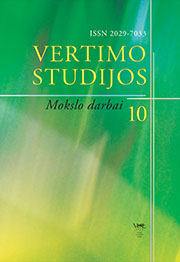THE EARLIEST ITALIAN TRANSLATIONS OF JOHN MILTON ’S “PARADISE LOST”: FAILED ATTEMPTS AND DANTESQUE INFLUENCES
THE EARLIEST ITALIAN TRANSLATIONS OF JOHN MILTON ’S “PARADISE LOST”: FAILED ATTEMPTS AND DANTESQUE INFLUENCES
Author(s): Moreno BondaSubject(s): Other Language Literature, 18th Century, 19th Century, Translation Studies
Published by: Vilniaus Universiteto Leidykla
Keywords: Translation; John Milton; Italian language;
Summary/Abstract: This paper deals with the history of translation in the 18th and 19th centuries. It investigates the reasons behind six unsuccessful attempts to translate John Milton’s Paradise Lost (1667) into the Italian language. We hypothesise that the problem was the rendering of unusually marked lexical, thematic, stylistic and rhythmical analogies with Dante’s Comedy and, mainly, with its sources. Adopting Antonio Bellati’s Italian translation (1856) as an indicator, our study focuses on problematic aspects intrinsic to the English poem. Specifically, we suggest that the challenge was the transposition of Paradise Lost’s peculiar mixture of style and meter: the blank verse of a Christian epic poem. This uniqueness rendered it too similar to Dante’s Comedy. Likewise, the setting and the subject matter of the English poem were too adherent to that of both Dante and Virgil’s Aeneid (one of Dante’s main sources). Finally, it might have been difficult to translate Milton into Italian because the English poet openly imitates the Italian epic style, its rhythmical and lexical choices. We conclude that it might have been arduous to avoid even more marked Dantesque influences in an Italian translation. In other words, this study depicts an unusual traductive instance of “excess of equivalence” for lexical and culturally specific items.
Journal: Vertimo studijos
- Issue Year: 10/2017
- Issue No: 10
- Page Range: 76-94
- Page Count: 19
- Language: English

